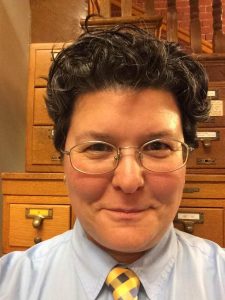
by Julia Nee
Meet Deborah Richards, the Special Collections Archivist at Mount Holyoke College, a small liberal arts college for women in South Hadley, Massachusetts! A graduate of Simmons College with a MSLIS in the archives concentration, Deborah previously worked with the state legislature in Oregon. With a BA in History and Women’s Studies from Oregon State University and a MA in American Studies from the University of Massachusetts, Boston, her interest in history, women’s studies, and activism still inform how she does her work as an archivist today. When she finally discovered archives, she realized she enjoyed research more than writing, and was hooked. Through her experiences as an intern at Houghton Library at Harvard University, student worker at Northeastern University, an archivist at the Schlesinger Library at the Radcliffe Institute at Harvard University, and the Assistant Archivist at the Smith College Archives, Deborah has nearly 20 years of experience working in archives.
For the last four years, Deborah’s day at Mount Holyoke College is always exciting because of her various tasks and responsibilities as one of two archivists. She never quite knows who is going to email or walk through the door. On an average day she could be providing reference services, accessioning new materials, supervising student workers, working with donors, performing stacks maintenance, or overseeing the oral history project for LGBTQ alums. Interestingly, Deborah commented that while a lot of professional focus recently has been on digital materials and resources, digital work is the least time consuming part if her job. Deborah is usually up and moving around, doing something new, and enjoys the range of work in archives.
Advocacy and outreach work is very important to Deborah. She believes that information is kept in an archives is not just there to be saved, but is meant to be used. To achieve that end, archives have to create openings for their discovery. For Deborah, advocacy and outreach are very similar because she wants to promote her archives and its material just as much as everyone else’s archives and their materials. She says that it is a disservice not to do outreach. The most exciting advocacy and outreach project Deborah currently has in progress is the LGBTQ Alum Oral History Project. Recognizing the limited representation of LGBTQ history related to Mount Holyoke in the archives, the archives has interviewed over 50 alums to document their time on campus.
Deborah’s archives offers a variety of other advocacy and outreach programs at Mount Holyoke. First, the Archives and Special Collection is very active on social media, thanks mostly to student workers. The archives uses many platforms to reach the most people, including Twitter, YouTube, tumblr, Pinterest, Instagram, and Snapchat. To further showcase some of their collections, the archive produces numerous exhibits, both online and in house. The archives hosts ‘Crafternoons,’ a monthly afternoon of crafts for students to get them through the door, make them familiar with the archives, and introduce history or archival materials. A recent craft was creating old-fashioned felt college pennants, and an upcoming activity is ‘Do It Yourself Tea Bags.’ The archives also has a project called Transform/Transcribe which involves crowdsourcing transcription of letters from the archives’s collections. This type of project shares what the archives has and tells volunteers and alums that the archives wants them to visit, help, and be involved. Additionally, Deborah involves the archives in other on-campus activities. The archives brings its button maker to campus activities like Mountain Day, to increase its visibility and network. The archives works closely with classes and professors and the Alumnae Quarterly for publications.
For Deborah, the best types of advocacy and outreach projects are those that involve the audience. She argues that if you let people actually get their hands on something or do something, they will be far more engaged. Some of her favorite projects from other institutions have been oral history projects, the CLGA’s walking tours, and the History Project’s Gayme Night (an evening of board games taken from the collection). She does recognize the challenges, specifically limited time, in creating a successful program. There are a lot of behind-the-scenes, time-consuming steps, rehousing materials for displays for example, so Deborah thinks it is essential to find small ways to do outreach, like the student directed social media and the traveling button maker. She is always inspired by what other archives are doing.
